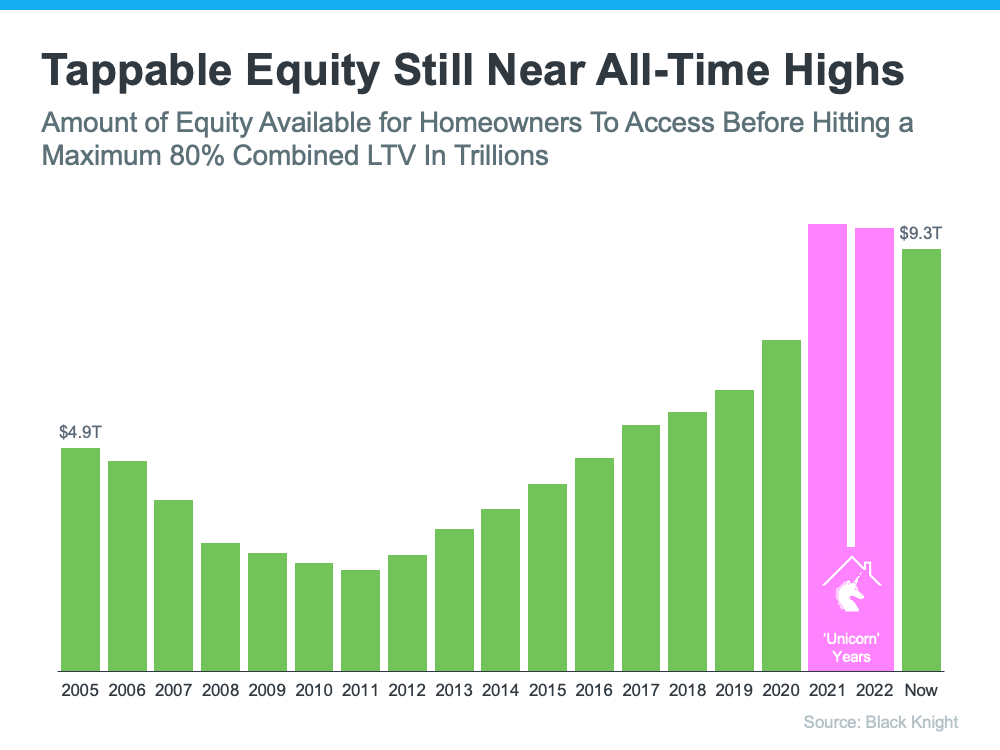A Drop in Equity Doesnt Mean Low Equity

You may see media coverage talking about a drop in homeowner equity. What's important to understand is that equity is tied closely to home values. So, when home prices appreciate, you can expect equity to grow. And when home prices decline, equity does too. Here's how this has played out recently.
Home prices rose rapidly during the unicorn years. That gave homeowners a considerable equity boost. But those unicorn years couldn't last forever. The market had to moderate at some point, and that's what we saw last fall and winter.
As home prices dropped slightly in the back half of 2022, equity was impacted. Based on the most recent report from CoreLogic, there was a 0.7% dip in homeowner equity over the last year. However, the headlines reporting on that change aren't painting the whole picture. The reality is, while home price depreciation during the second half of last year caused equity to drop, the data shows homeowners still have near record amounts of equity.
The graph below helps illustrate this point by looking at the total amount of tappable equity in this country going all the way back to 2005. Tappable equity is the amount of equity available for homeowners to access before hitting a maximum 80% loan-to-value ratio (LTV). As the data shows, there was a significant equity boost during the unicorn years as home prices rapidly appreciated (see the pink in the graph below).
But heres whats key to realize even though theres been a small dip, total homeowner equity is still much higher than it was before the unicorn years.
And there's more good news. Recent home price reports show the worst home price declines are behind us, and prices have started to go up again. As Selma Hepp, Chief Economist at CoreLogic, explains:
Home equity trends closely follow home price changes. As a result, while the average amount of equity declined from a year ago, it increased from the fourth quarter of 2022, as monthly home prices growth accelerated in early 2023.
The last part of that quote is particularly important and is the piece of the puzzle the news is leaving out. To further emphasize the positive turn were already seeing, experts say home prices are forecast to appreciate at a more normal rate over the next year. In the same report, Hepp puts it this way:
The average U.S. homeowner now has more than $274,000 in equity up significantly from $182,000 before the pandemic. Also, while homeowners in some areas of the country who bought a property last spring have no equity as a result of price losses, forecasted home price appreciation over the next year should help many borrowers regain some of that lost equity.
And even though Odeta Kushi, Deputy Chief Economist at First American, references a slightly different number, Kushi further validates the fact that homeowners have a lot of equity right now:
Homeowners today have an average of $302,000 in equity in their homes.
That means if you've owned your home for a few years, you likely still have way more equity than you did before the unicorn years. And if you've owned your home for a year or less, the forecast for more typical price appreciation over the next year should mean your equity is already on the way back up.
Bottom Line
Context is everything when looking at headlines. While homeowner equity dropped some from last year, its still near all-time highs. Reach out to a trusted real estate professional so you can get the answers you deserve from an expert who's there to help as you plan your move this year.



